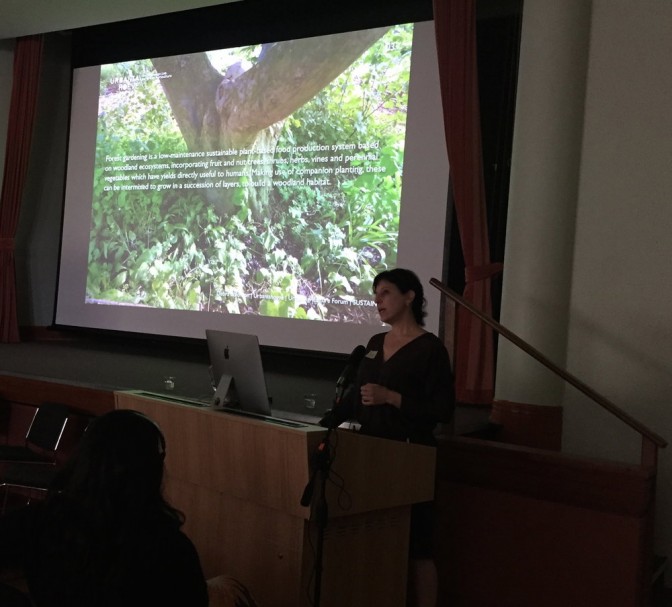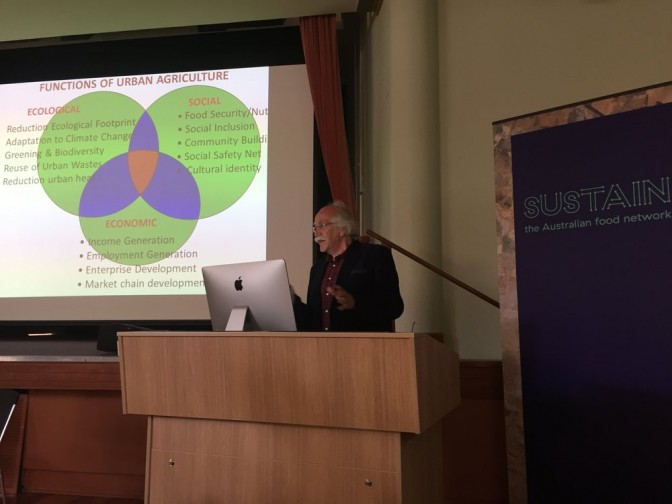The 2016 Urban Agriculture Forum was held on November 20-21 at the University of Melbourne’s Burnely Campus. The event was organized by Sustain: The Australian Food Network in partnership the University of Melbourne Burnley Campus, 3000 Acres, Cultivating Community, Moreland Food Gardens Network, The City of Yarra, and Port Phillip Ecocentre. The Forum brought together over 200 people for both days of the event, with representatives from a range of areas across state and local government, the education, university and TAFE sectors, designers and urban planning, urban farmers, community and backyard gardeners, chefs and restaurateurs, food social enterprise and retail businesses, health professionals, emergency food relief providers, and food rescue and waste management authorities.
Showcasing over 35 speakers across two days, the 2016 UAF included international keynote speakers from the Netherlands in Debra Solomon (Urbaniahoeve) and Henk de Zeeuw (RUAF), international guest Pablo Ermini from Argentina, and an impressive list of representatives from around Australian that included;
- Bruce Pascoe (Author of Dark Emu)
- Chris Williams (University of Melbourne)
- Nick Rose (Sustain)
- Michael Zagoridis (Pocket City Farms)
- Morag Gamble (SEED)
- Anthea Fawcett (Remote Indigenous Gardens Network)
- Emily Connors (CERES Organic Market Garden)
- Mark Sanders (Moreland Food Gardens Network)
- Hermann Paulenz (Permablitz)
- Laura Phillips (Neometro)
- Sally Burgess (Victrack)
- Dan Green (Melbourne Water)
- Brian Coffey (RMIT)
- Kathi Orsanic-Clark (City of Yarra)
- Lee Tozzi (City of Darebin)
- Greg Jacobs (City of Melbourne)
- Peta Christensen (Cultivating Community)
- Kat Lavers (Hobsons Bay City Council)
- Sophie Lamond (Right to Food Coalition)
- Susie Scott (FareShare Melbourne)
- Amanda Miller (Impact Generation Partners)
- Professor Rachel Carey (University of Melbourne)
- Annemaree Docking (City of Whittlesea)
- Seb Lindner (Propagate)
- Rebecca Scott (STREAT)
- Oliver Shorthouse (Ramarro Farm)
- Miriam Issa (RAW)
- Costa Georgiadis (Gardening Australia)
- Claire Hetzel (Horticultural Therapist)
- Georgia Savage (Farmer Incubator)
- Ellie Blackwood (3000 Acres)
- Robert Van De Graaff (CSIRO)
Following on from the 2016 Urban Agriculture Forum was a national speaking tour which saw keynotes Debra Solomon and Henk de Zeeuw travel to Bendigo, Adelaide and Sydney in the days following the Forum. An Open Garden Day was also held on the 19th of November where over twenty gardens around Melbourne signed up to showcase and celebrate the richness and diversity of urban food growing spaces around the city. Garden gates were opened to the public to take part in scheduled tours, talks, workshops and food sharing events. Among the list of gardens involved were; 3000 Acres Saxon Street Garden, CERES Organic Farm & Community Garden, Fareshare Garden, Moreland Community Garden (West Brunswick), and the Carlton Neighbourhood Learning Centre Multicultural Food Garden.
The Forum itself was an outstanding success, with the event succeeding in achieving its main objectives of;
- Bringing together practitioners and policy-makers from across the urban and peri- urban food landscape to build a shared understanding of what urban agriculture is, and the benefits and opportunities it can offer in the Australian context, specifically in regards to:
- Creating more resilient urban environments, strengthening food security and meeting the challenges of adapting to climate change
- Enhanced access to fresh fruit and vegetables, especially for marginalised and low-income communities
- Employment and training opportunities for disadvantaged and marginalised groups
- Reduced environmental impacts through less transport, packaging and storage
- Recognising and celebrating the achievements of the urban agriculture movement over the past decade (and in some cases before) in Australia, both at the community and local government levels
- Sharing lessons of good and best practice urban agriculture models, as well as failures and successes, from both within Australia and internationally
- Identifying and discussing the legislative, regulatory and resourcing barriers to the further expansion of urban agriculture in Melbourne and beyond
- Developing a common platform and set of proposals to the State government to address the identified barriers to urban agriculture in Australia (link to other post)
Keynote Presentations
Debra Solomon / Urbaniahoeve: The City as our Farm / Urban Agriculture foodshed, watershed and the climate crisis: new roles for humans within forest garden and urban soil ecosystems

In her keynote presentation, Debra Solomon discussed cases from her work in Urbaniahoeve Social Design Lab for Urban Agriculture since 2009, including activities ranging from forest garden implementation to in situ topsoil production and remediation, to art production. Debra show’s how different approaches to soil and biodiversity analysis frame different perceptions of the human role towards the ecosystem. She argue’s that aside from yielding different insights into soil fertility, the freedom of the artistic practice that allows for visualisation techniques to be interpreted as data (e.g. soil chromatography), complementary to quantification techniques, also yield perceptions of the relationship between humans with regard to the soil organism and ultimately to the ecosystem at large, and that guide human behaviour and governance.
Download and listen to Debra Solomon's keynote presentation here (.m4a, 80mb)
Henk De Zeeuw / Senior advisor RUAF Foundation / The role of urban agriculture in the development of healthy, sustainable and resilient cities

In his keynote presentation, Henk de Zeeuw begins by providing the RUAF definition of urban agriculture, which includes intra- and peri-urban agriculture, production for self-consumption or social functions as well as commercial agriculture, on land as well as on rooftops and indoors, production as well as processing and distribution. Henk illustrates these dimensions of urban agriculture by providing a number of examples from both the global North and global South. Through recognising urban agriculture as a dynamic and innovative sector of the urban system, Henk suggests it can play various functions in the development of a sustainable, inclusive and resilient city by addressing some critical urban challenges faced by cities today. Three urban challenges are explored; increasing urban food insecurity and malnutrition, growing urban ecological and resilience problems, lack of employment / enterprise development.
The presentation concludes with some of the lessons learnt by the RUAF Foundation through working with over 25 cities to develop specific food and agriculture policy / strategies or programme(s). These lessons provide the basis for the learning points Henk then explores regarding the factors that strongly influence success in food and agriculture policy development and action planning.